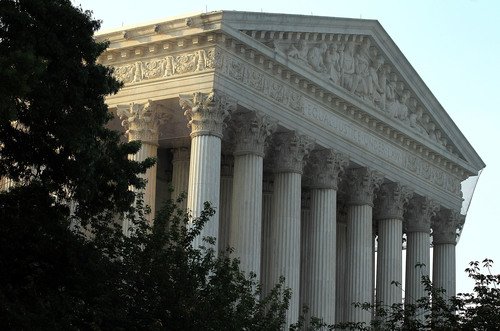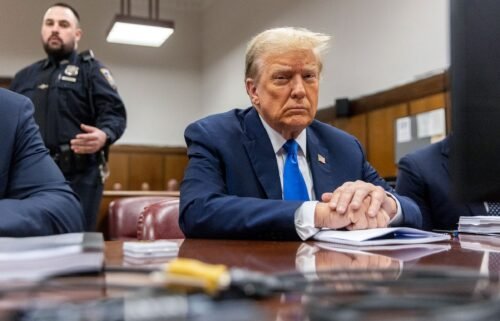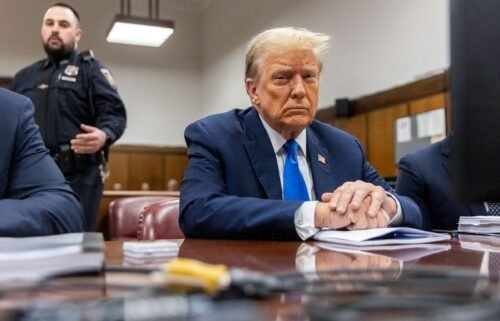Supreme Court considers Montana ruling blocking government subsidies for religious schools

Chief Justice John Roberts, who presided over Senate impeachment trial until around 2 a.m. ET Wednesday morning, was in his usual seat at the center of the Supreme Court bench at 10:00 a.m. to preside over a major dispute that could open the door to more state funds going toward religious education.
Wearing his black robe with glasses perched on his nose, Roberts showed no outward signs of fatigue after his marathon day serving the political branches.
The handful of questions he did ask in court, however, reflected that his ultimate vote, as it often is, could be key.
The dispute involving a Montana ruling blocking government subsidies for religious schools is the latest high-profile case religious freedom supporters, including the Trump administration, hope the newly solidified conservative majority will expand rights under the free exercise clause of the Constitution.
Critics of the lawsuit fear the court could blur the line between church and state and they see the case as an attack on public education.
Justice Ruth Bader Ginsburg led the charge arguing the case should be dismissed on procedural grounds, as she has in several cases this term. Liberal Justices Elena Kagan and Sonia Sotomayor seemed firmly in agreement. One of Roberts’ questions did reflect he thought there might be grounds for dismissal, but it’s unclear if that would be his ultimate vote. If the court were to dismiss the case, it would put off a significant religious liberty ruling, at least for now.
Conservative Justices Samuel Alito and Brett Kavanaugh, on the other hand, suggested that they were poised to expand rights under the free exercise clause of the Constitution. It is likely that Justices Neil Gorsuch and Clarence Thomas would vote the same way.
Kavanaugh noted that many state laws barring government funds for religious education stem from an early trend dating back to the 1800s directed against Catholics during a period of widespread hostility to Catholic schools. Kavanaugh called the trend a symptom of “grotesque” religious bigotry.
The controversy stems from a program created by the Montana legislature in 2015 that allowed residents to receive a tax credit of up to $150 for a contribution to a scholarship program. The donations were then used to fund tuition scholarships for children seeking to attend the private school of their choice. In Montana, the majority of private schools are religiously affiliated.
Soon after, however, the Montana Department of Revenue excluded religiously affiliated schools from the program, citing the fact that the state Constitution bars state funds for religious education.
Three low-income mothers, Kendra Espinoza, Jeri Ellen Anderson and Jaime Schaefer, sued, saying they were counting on the scholarships so that they could keep their children at the Stillwater Christian School in Kalispell, Montana.
Their lawyers from the non-profit Institute for Justice argued that they couldn’t be denied public benefits that were widely available to others for non religious, private schools.
The Montana Supreme Court invalidated the whole program holding that it violated the state constitution that bars state funds to aid religious schools.
“A state’s constitutional prohibition against aide to sectarian schools may be broader and stronger than the First Amendment’s prohibition against the establishment of religion,” the court held.
In their appeal, the Institute for Justice wants the justices to rule that the state Supreme Court opinion violates the federal Constitution.
In court, Ginsburg seized on the fact that Montana’s program is no longer on the books and questioning whether there is the necessary live case or controversy currently before the court.
“What is the harm that the parents are suffering right now?” she asked. Kagan noted that the parents are currently in the “same boat” as other parents seeking to use the funds for secular private schools. Sotomayor expressed similar sentiments. And at one point, Roberts suggested that the case should have been brought, not by the parents, but the school. The injury, he said, “flows through the school.”
Richard Komer, a lawyer for the mothers, said that they had been injured because of the “wholesale exclusion” of religious schools from a program available to other private schools.
“The Free Exercise, Establishment and Equal Protection Clauses all demand that the government show neutrality — not hostility — toward religion in student-aid programs,” he wrote in court briefs.
He said that Montana’s amendment that bars state funds for religious schools violates the equal protection clause because it is rooted in religious animus. They argue it stems from an early trend dating back to the 1800s directed against Catholics during a period of widespread hostility to Catholic schools.
The case is a follow-on to a 2017 opinion when the Supreme Court — in an opinion penned by Roberts — ruled that a Missouri policy that excluded a church-run preschool from a grant program used to resurface playgrounds was unconstitutional. In a footnote, however, Roberts said that the opinion did not concern funds used for religious purposes — leaving that issue for another day.
Now challengers in the case at hand want the justices to take the next step.
“In this case, we are asking the Court to declare that the First Amendment requires government to be neutral — not hostile — toward religion,” Institute for Justice lawyer Timothy Keller said.
In court, Alito and Kavanaugh suggested the Montana case should be governed by the court’s ruling in 2017. But Kagan stressed that the two cases are different and that in the Montana case the government funds go to a religious activity. That’s a “far cry” she said from the earlier case which simply dealt with the surface of a playground.
Some 37 other states have similar amendments barring public funds for religious affiliated education although they vary in stringency. For example, while Montana’s provision bars “any direct or indirect” payment from any public fund, other states only prohibit funds direct from the public treasury.
Representing the Trump administration, Solicitor General Noel Francisco sides with the parents arguing that the state’s Constitutional Amendment violates the federal Constitution’s Free Exercise Clause because it discriminates on the basis of “religious status in the distribution of public benefits.”
In essence Francisco argues, the state can’t impose a “special disability” on religious schools.
If he prevails, the ruling will be a victory for supporters of public funding for religious education and a bitter loss for those who say it will undermine public education.
“It would require the diversions of scarce resources from public school systems all across the country into religious schools,” said Randi Weingarten, president of the American Federation of Teachers.
Jessica Levinson, a professor at Loyola Law School, says the case might appeal to the conservative majority on the Supreme Court.
“Make no mistake, the current court is conservative and the case could be part of a steady march toward interpreting the Free Exercise Clause to require states to treat some secular and religious institutions as equally deserving of public funds” Levinson said. “Church, meet a very welcoming state.”
Lawyers for Montana argue that the amendment is valid because states are finding a balance — protecting the free exercise of religion while ensuring the separation of church and state.
“States should have the latitude to decide whether to enact school-choice programs that support religious schools,” Adam Unikowsky, lawyer for the state, wrote in briefs. “They should also have latitude to decide not to enact them—which includes the latitude to bar such programs at the state constitutional level.”
Unikowsky said that the Montana’s Supreme Court decision ensured that “no one would be penalized for exercising their religion,” because the entire program was struck down.
Colorado and eight other states that have similar constitutional provisions that bar government funds to religious schools support Montana. “The Framers recognized that no single solution would work for all states, and left room for individual states to make decisions about the issue of aid to religion,” Philip J. Weiser, Colorado’s attorney general argued. Weiser noted that the Supreme Court has “never suggested that the Free Exercise Clause compels the States to fund religious schools in the same manner or to the same extent as public schools.”
But Oklahoma and 17 other states counter that courts in nine states with similar constitutional provisions have already construed the provision in a way that permits tax credit programs similar to that of Montana. Some have noted that providing the tax credits is not the same thing as using money directly from the state’s coffer. The states are fearful if the Supreme Court upholds the Montana Supreme Court’s opinion it would trigger other states to eliminate similar tax-credit scholarship programs.
“This would risk harming students in those states, many of whom are low income or have disabilities,” Oklahoma Attorney General Mike Hunter wrote in a court brief.



